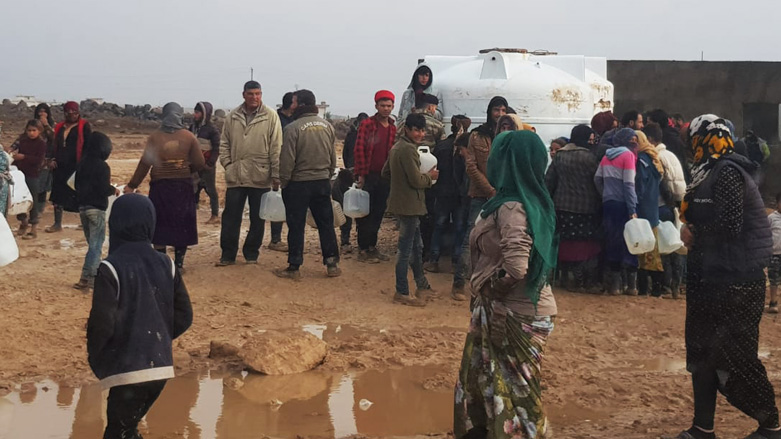Turkish-backed group cuts water supply to northeastern Syria for fourth time

ERBIL (Kurdistan 24) – For the fourth time in two weeks, Turkish-backed armed groups have cut the flow of water from the Alook reservoir to areas in northeastern Syria’s Hasakah province under the control of the local Kurdish-led government, depriving some 460,000 people in the region of the essential resource.
“The Turkish occupation drove the workers out of the [water] plant, and put it off for unknown reasons,” the co-chair of the Directorate of Water in Hasakah, Suzdar Ahmed, told local media.
The Alouk Water Station is located near the border town of Serekaniye, which Turkey and its militant proxies took control of in October 2019 during its so-called Peace Spring Operation.
Under Russian mediation, though, northeastern Syria has been providing electricity to the Turkish-occupied areas in exchange for water flow.
However, Turkish-backed groups have regularly cut off the water to demand Kurdish-led authorities in northeast Syria provide more electricity.
On March 21, Turkish-backed groups demanded more electricity and expelled the workers at the station, again cutting water supply for nearly a week.
Thomas McClure, a Syria-based researcher at the Rojava Information Center, told Kurdistan 24 that the water supply was resumed between March 26 and 28.
The water was again cut on Saturday, leaving thousands without access to clean drinking water.
Yesterday, Turkey again cut water flow to Hasekah region, for the third time this month.
— Rojava Information Center (@RojavaIC) March 29, 2020
As previously, 460,000+ people are left without access to drinking water, including hundreds of thousands of IDPs and camp residents, plus North and East Syria's main quarantine hospital. https://t.co/HJdvlVMIVs
On March 23, UNICEF Representative in Syria Fran Equiza said the interruption “during the current efforts to curb the spread of the coronavirus disease puts children and families at unacceptable risk.”
“Handwashing with soap is critical in the fight against COVID-19 (coronavirus),” he stressed.
Equiza also underlined that the station is the main source of water for around 460,000 people in Hasakah city, Tal Tamer, and the al-Hol and Areesha camps.
On March 27, 49 Syrian civil society and human rights organizations condemned the water interruption in a jointly signed statement.
“This intentional denial of water that the residents of these areas are suffering is a blatant violation of international humanitarian law and is a war crime,” the statement read.
“This deprivation is also a breach of the right of northeastern Syria’s population to safe and potable water.”
The organizations called on UN groups, as well as the United States and the European Union, to “pressure the Turkish Government to allow the provision of water to deprived areas.”
The joint statement also underlined that the residents in northeastern Syria need to “have equal access to water resources without discrimination of any kind.”
Bassam al-Ahmad, the executive director of Syrians for Truth and Justice, told Kurdistan 24 that Turkey is using any tools necessary for political leverage, such as the refugee card against the European Union.
“They don’t care about the consequences, especially now (during the coronavirus pandemic),” he stated.
“There are more than 60,000 IDPs (Internally Displaced Persons) in camps that rely on this water. There is the coronavirus. A lot of people – children and women – need to wash their hands to stay clear and far from the virus.”
Ahmad underlined that UN organizations such as the World Health Organization (WHO) and governments should pressure Turkey to stop using “this water as a tool to gain political leverage.”
He underlined that everyone in Syria’s northeast, Kurds and Arabs, should all equally benefit from the water.
“But this is not a normal time when people can freely travel, the self-administration is imposing a curfew [due to the coronavirus], and people are not allowed to move,” Ahmad explained.
“So, in this time, it really creates a disaster on the people that are relying 100 percent on this water station.”
Editing by Karzan Sulaivany
